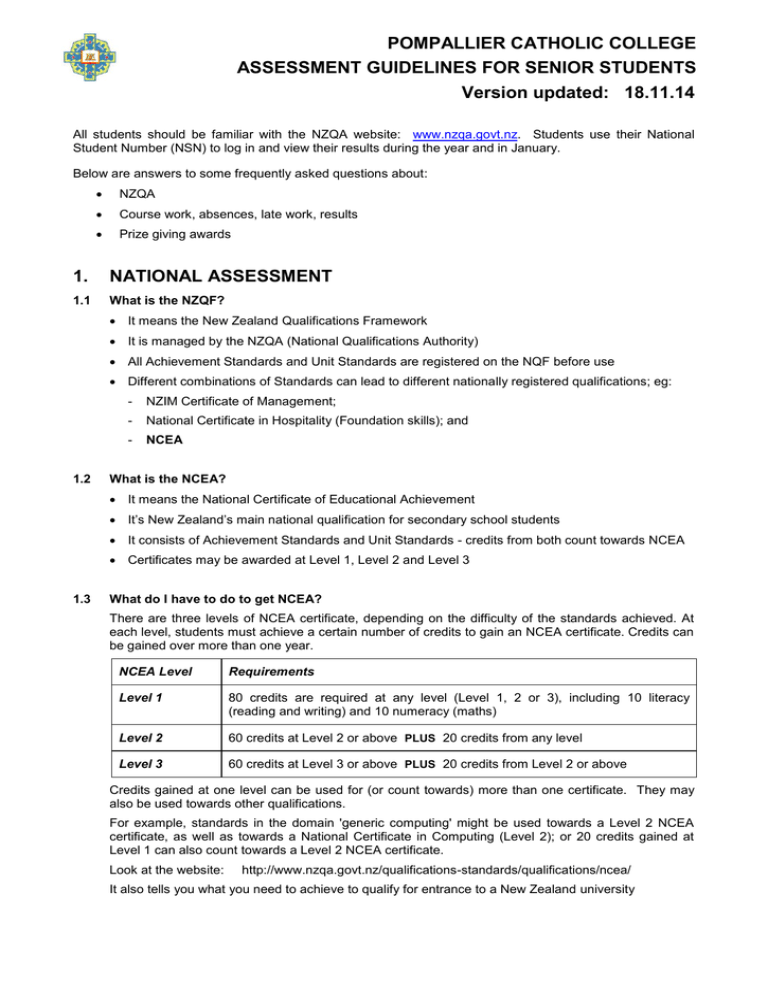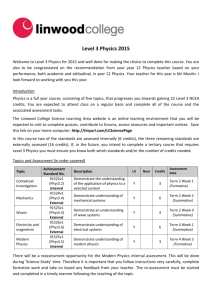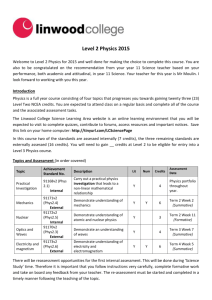here - Pompallier catholic College
advertisement

POMPALLIER CATHOLIC COLLEGE ASSESSMENT GUIDELINES FOR SENIOR STUDENTS Version updated: 18.11.14 All students should be familiar with the NZQA website: www.nzqa.govt.nz. Students use their National Student Number (NSN) to log in and view their results during the year and in January. Below are answers to some frequently asked questions about: NZQA Course work, absences, late work, results Prize giving awards 1. NATIONAL ASSESSMENT 1.1 What is the NZQF? It means the New Zealand Qualifications Framework It is managed by the NZQA (National Qualifications Authority) All Achievement Standards and Unit Standards are registered on the NQF before use Different combinations of Standards can lead to different nationally registered qualifications; eg: 1.2 - NZIM Certificate of Management; - National Certificate in Hospitality (Foundation skills); and - NCEA What is the NCEA? It means the National Certificate of Educational Achievement It’s New Zealand’s main national qualification for secondary school students It consists of Achievement Standards and Unit Standards - credits from both count towards NCEA Certificates may be awarded at Level 1, Level 2 and Level 3 1.3 What do I have to do to get NCEA? There are three levels of NCEA certificate, depending on the difficulty of the standards achieved. At each level, students must achieve a certain number of credits to gain an NCEA certificate. Credits can be gained over more than one year. NCEA Level Requirements Level 1 80 credits are required at any level (Level 1, 2 or 3), including 10 literacy (reading and writing) and 10 numeracy (maths) Level 2 60 credits at Level 2 or above PLUS 20 credits from any level Level 3 60 credits at Level 3 or above PLUS 20 credits from Level 2 or above Credits gained at one level can be used for (or count towards) more than one certificate. They may also be used towards other qualifications. For example, standards in the domain 'generic computing' might be used towards a Level 2 NCEA certificate, as well as towards a National Certificate in Computing (Level 2); or 20 credits gained at Level 1 can also count towards a Level 2 NCEA certificate. Look at the website: http://www.nzqa.govt.nz/qualifications-standards/qualifications/ncea/ It also tells you what you need to achieve to qualify for entrance to a New Zealand university -2- 1.4 What are subject and course endorsement? Certificates can be “endorsed” to reflect high achievement in a significant number of standards. 1.4.1 Certificate Endorsement If a student gains 50 credits at Excellence, their NCEA will be endorsed with Excellence. Likewise, if a student gains 50 credits at Merit (or Merit and Excellence), their NCEA will be endorsed with Merit. Credits earned can count towards an endorsement over more than one year and more than one level. However, they must be gained at the level of the certificate or above. For example, Level 2 credits will count towards endorsement of a Level 1 NCEA, but Level 1 credits will not count towards endorsement of a Level 2 NCEA. 1.4.2 Course Endorsement A course endorsement provides recognition for a student who has performed exceptionally well in an individual course. Students will gain an endorsement for a course if, in a single school year, they achieve both of: 14 or more credits at Merit or Excellence at the lower level that supports the endorsement at least 3 of these credits from externally assessed standards and 3 credits from internally assessed standards. (Note: this does not apply to Physical Education, Religious Studies and Level 3 Visual Arts) 1.5 How do I gain entrance to a New Zealand university? From 2014, to be awarded UE students will need: NCEA Level 3 Three subjects - at Level 3 or above, made up of: o 14 credits each, in three approved subjects Literacy - 10 credits at Level 2 or above, made up of: o 5 credits in reading o 5 credits in writing Numeracy - 10 credits at Level 1 or above, made up of: o Achievement Standards – specified achievement standards available through a range of subjects, or o Unit Standards - package of three numeracy unit standards (26623, 26626, 26627- all three required). 1.6 How do I keep track of my credits? In every senior course you will be given an outline which lists the standards available, so you will know how many credits you could achieve. During the year, results are sent to NZQA so you can log on using your NSN and see your current results. You can also ask your whanau teacher to show you your results on KAMAR. 1.7 How do I get my results? You can access the NZQA website at www.nzqa.govt.nz/login to see your results anytime. You will require your National Student Number (NSN) and password to log on. End of year results are no longer posted unless you make a request. When you have received your marked answer booklets, you have the right to request: a review, if a processing error has occurred or a reconsideration, if you believe an error in marking has occurred When reviews and reconsiderations have been dealt with, you can order online a final ROA (Record of Achievement) - this is the one you would normally use when applying for university or a job, and a certificate. -3- 2. COURSE WORK 2.1 Do I have to do all the work? If you are being assessed for a standard, you MUST do all parts of the assessment in order to get a grade. Your teachers may be able to take evidence from authentic class work into account when awarding a grade. They may: ask you to fill out a template; look at your earlier milestone-point checks; look at their notes on feedback and consultations they’ve had with you; refer to earlier re-drafts you’ve done; check your portfolio / journal / diary / workbook / checklists; have a conference with you on the spot. 2.2 Can I withdraw from a standard? If you wish to be withdrawn from any standard you must make that decision with your teacher and caregiver. The teacher must have evidence of your caregivers approval and you must be withdrawn before beginning the internal assessment or the final date for withdrawing from externals. If you have attempted the assessment, you must receive a grade for your work. 2.3 Can I use another student’s work? No. You may not copy another student’s work; and you may not (re-)present another student’s work, from a previous year, as your own. You will be required to verify in writing that work you present for assessment is your own. This includes not copying work from the internet and presenting it as your own. See information on the NZQA website about authenticity. Any suspicion of unfair behaviour, in exams or internal assessments, will be investigated and could result in Not Achieved grades. 2.4 What is the process for handing in work? Work must be handed in at the Student Centre by 3.15pm on the due date, unless otherwise stated by individual departments / teachers. Assessments are to be presented on paper, which means that you are responsible for printing work at home, or making sure you have sufficient credit on your printing account at school to print. Unless personally arranged, digital copies of work are not acceptable. Work emailed to staff after the deadline time and date will be assessed Not Achieved. 2.5 What do I do if I am unable to hand in an assessment on time? If you know you are going to be absent, assessments can be handed in early or a new submission date may be discussed with your teacher. Your teacher is not obliged to give you an extension. If you are sick, a medical certificate must be handed in to the Student Centre. A note from home is not enough. A voluntary absence or late submission is not acceptable. Late work will receive a Not Achieved grade. 2.6 What is the difference between a resubmission and a reassessment? A resubmission means you are given the opportunity to correct mistakes which you should be capable of discovering and correcting on your own. You will not have received any further teaching on the topic. A reassessment means the whole standard may be assessed for a second time, using a different assessment task after further teaching has been carried out. You will have been advised if this is being offered before beginning work on a standard. 2.7 When will I get my assessed work back? Your teacher will tell you, on the date the work is due, when it will be returned. Teachers endeavor to return work within three weeks. -4- 2.8 What do I do if I don’t agree with a decision I got for an Internal Assessment activity? First, talk it over with your teacher at the time s/he returns the work to you - you may resolve it then and there. If you can’t agree, take it to the Head of Department for that subject. If there’s still no agreement, get an “Internal Assessment Appeal” form from the Principal’s Nominee within five days of the return of the assessed work. An outside expert may be asked to verify the assessment decision. Remember: you will be given clear guidelines on Assessment Opportunities at the start of your year’s programme. 2.9 How will my teachers help me to get the best grades I can? Can I have another try if I don’t do well the first time? If your teacher has said that there will be one further assessment opportunity, any student may elect to repeat an assessment. It is not the intention to allow students a further assessment opportunity where they have chosen for unacceptable reasons not to take the first opportunity. Students must be awarded the highest grade they have achieved over both opportunities. 2.10 Do I have to keep my marked work? Usually, teachers will take it or a copy back from you for moderation purposes. If you do get to keep it, file it away safely. 2.11 What help will I get if I have learning difficulties? Candidates who have permanent or long-term conditions or learning difficulties, which they believe will significantly impair their performance, may apply to the Qualifications Authority, through the Principal’s Nominee, for Special Assessment conditions such as enlarged papers, extra time, computer use, reader, writer, reader & writer. Applications need to be made each year that the student is entered for NCEA assessment and be attached to specific, selected subjects. In addition, students should be receiving ongoing support at school to manage their difficulties, and sit their internal assessments and school exams under the same conditions that they apply for. Appropriate individual conditions and venues will be provided within the College for Special Assessment candidates. Venues, times and materials required for special assessment will be under the direct supervision of the SENCO, in liaison with the Principal’s Nominee. 2.12 What happens if I miss an external exam? A student who is unable to sit an exam, for an approved reason, may apply through the Principal’s Nominee (PN) for a derived grade. A form must be completed by a medical practitioner or similar. See the exam information you received from NZQA in November. The PN will use grades awarded for school practice exams to assist the process. 2.13 What is not acceptable behaviour in exams? The following will be investigated and could result in Not Achieved grades: Failure to follow instructions Influencing / assisting / hindering candidates or disrupting the examination Dishonest practice by a candidate Impersonation -5- 2.14 How do I change a subject I don’t like or am not doing well in? You cannot just change a subject. You originally chose it after much thought. You must consult with the Dean who will give you advice about the process and will involve your teacher and parent/caregiver in any decision. 3. END OF YEAR PRIZEGIVING / DUX 3.1 How do I gain top in class? Awards are made based on students Grade Point Average (GPA) 3.2 How is the GPA worked out? In each Standard, the number of Credits is multiplied by: - Excellence x 4 - Merit x 3 - Achieved x 2 The total score is then divided by the maximum possible score. E.g.: 24 credit course maximum score is 24 x 4 = 96. To calculate a student’s performance, we divide their points by 96, multiply by 100, giving a GPA in that subject. The best 24 credits are used if a course has more than 24 credits. 3.3 How do I gain Dux? The top 4 GPA’s plus Religious Studies are combined and candidates’ results compared. If a student has studied a Level 3 subject in Year 12, results could count towards their placement at the end of Year 13. 3.4 What is the Jean Claude Colin Award? To complete Year 13 with a Jean Claude Colin Award, you must have attained: 80% attendance An average success rate in excess of 66% for all NZQA standards attempted in Year 13, and at least two NZQA standards or better in Religious Studies Service to the College in at least two areas of service Participation in Special Character activities A full copy of the Award criteria is available in the Year 13 Common Room. If you are successful in these things, the Award will be presented at the senior prize giving.

